Samsung SSD 840 Pro (256GB) Review
by Anand Lal Shimpi on September 24, 2012 7:00 AM EST- Posted in
- Storage
- SSDs
- Samsung
- Samsung SSD 840
AnandTech Storage Bench 2011
Two years ago we introduced our AnandTech Storage Bench, a suite of benchmarks that took traces of real OS/application usage and played them back in a repeatable manner. I assembled the traces myself out of frustration with the majority of what we have today in terms of SSD benchmarks.
Although the AnandTech Storage Bench tests did a good job of characterizing SSD performance, they weren't stressful enough. All of the tests performed less than 10GB of reads/writes and typically involved only 4GB of writes specifically. That's not even enough exceed the spare area on most SSDs. Most canned SSD benchmarks don't even come close to writing a single gigabyte of data, but that doesn't mean that simply writing 4GB is acceptable.
Originally I kept the benchmarks short enough that they wouldn't be a burden to run (~30 minutes) but long enough that they were representative of what a power user might do with their system.
Not too long ago I tweeted that I had created what I referred to as the Mother of All SSD Benchmarks (MOASB). Rather than only writing 4GB of data to the drive, this benchmark writes 106.32GB. It's the load you'd put on a drive after nearly two weeks of constant usage. And it takes a *long* time to run.
1) The MOASB, officially called AnandTech Storage Bench 2011 - Heavy Workload, mainly focuses on the times when your I/O activity is the highest. There is a lot of downloading and application installing that happens during the course of this test. My thinking was that it's during application installs, file copies, downloading and multitasking with all of this that you can really notice performance differences between drives.
2) I tried to cover as many bases as possible with the software I incorporated into this test. There's a lot of photo editing in Photoshop, HTML editing in Dreamweaver, web browsing, game playing/level loading (Starcraft II & WoW are both a part of the test) as well as general use stuff (application installing, virus scanning). I included a large amount of email downloading, document creation and editing as well. To top it all off I even use Visual Studio 2008 to build Chromium during the test.
The test has 2,168,893 read operations and 1,783,447 write operations. The IO breakdown is as follows:
| AnandTech Storage Bench 2011 - Heavy Workload IO Breakdown | ||||
| IO Size | % of Total | |||
| 4KB | 28% | |||
| 16KB | 10% | |||
| 32KB | 10% | |||
| 64KB | 4% | |||
Only 42% of all operations are sequential, the rest range from pseudo to fully random (with most falling in the pseudo-random category). Average queue depth is 4.625 IOs, with 59% of operations taking place in an IO queue of 1.
Many of you have asked for a better way to really characterize performance. Simply looking at IOPS doesn't really say much. As a result I'm going to be presenting Storage Bench 2011 data in a slightly different way. We'll have performance represented as Average MB/s, with higher numbers being better. At the same time I'll be reporting how long the SSD was busy while running this test. These disk busy graphs will show you exactly how much time was shaved off by using a faster drive vs. a slower one during the course of this test. Finally, I will also break out performance into reads, writes and combined. The reason I do this is to help balance out the fact that this test is unusually write intensive, which can often hide the benefits of a drive with good read performance.
There's also a new light workload for 2011. This is a far more reasonable, typical every day use case benchmark. Lots of web browsing, photo editing (but with a greater focus on photo consumption), video playback as well as some application installs and gaming. This test isn't nearly as write intensive as the MOASB but it's still multiple times more write intensive than what we were running in 2010.
As always I don't believe that these two benchmarks alone are enough to characterize the performance of a drive, but hopefully along with the rest of our tests they will help provide a better idea.
The testbed for Storage Bench 2011 has changed as well. We're now using a Sandy Bridge platform with full 6Gbps support for these tests.
AnandTech Storage Bench 2011 - Heavy Workload
We'll start out by looking at average data rate throughout our new heavy workload test:
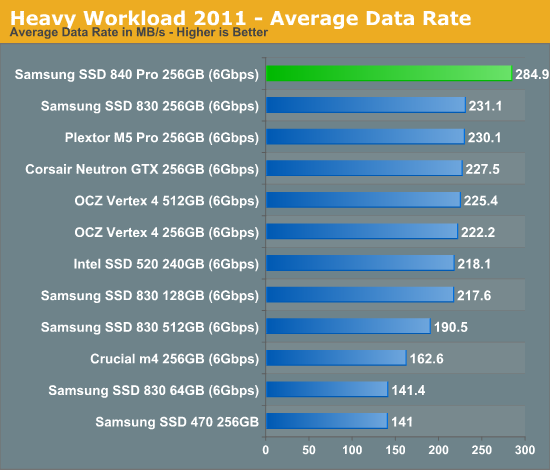
A strong showing in all of our low level IO tests, with no drawbacks, results in 24% better performance than the 830 in our heavy workload. There's simply no faster drive than the 840 Pro.
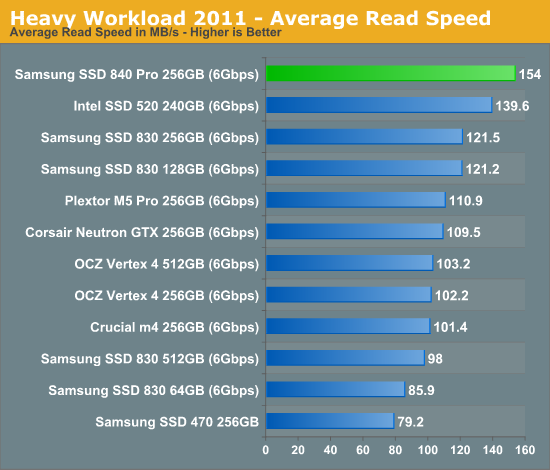
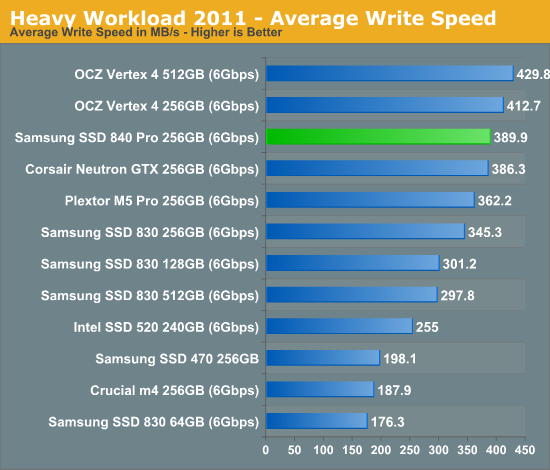
The next three charts just represent the same data, but in a different manner. Instead of looking at average data rate, we're looking at how long the disk was busy for during this entire test. Note that disk busy time excludes any and all idles, this is just how long the SSD was busy doing something:
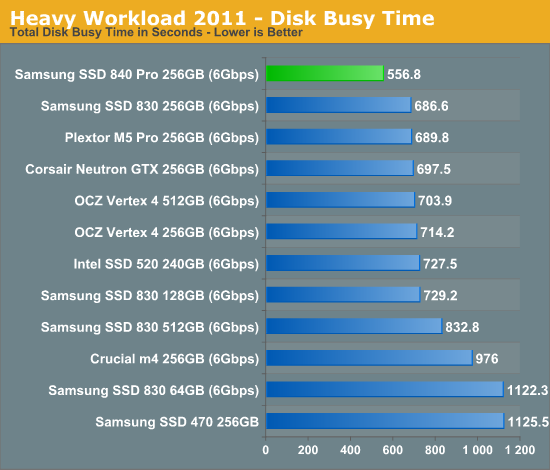
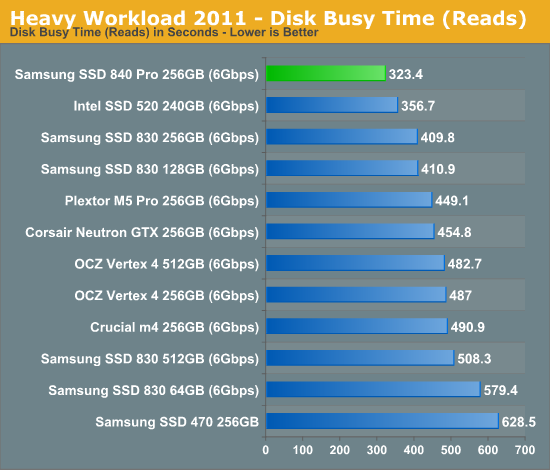
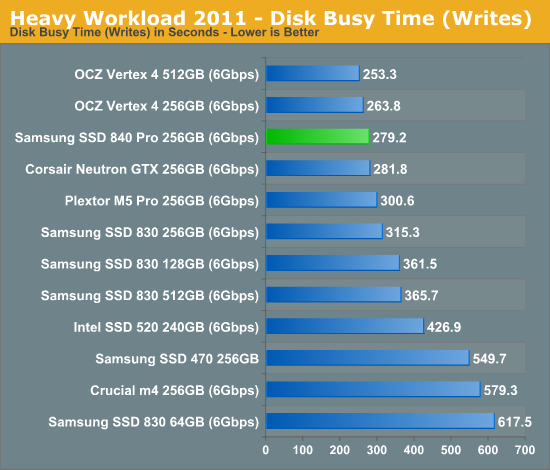










96 Comments
View All Comments
Benny_k80 - Thursday, November 15, 2012 - link
Me too. I'm about to order one but i wont do it until i get any clarification :(Beaver M. - Sunday, November 18, 2012 - link
I guess thats why they are still not available/have been not available for so long.Still, Samsung should have told Anandtech already whats going on...
KenCl - Monday, November 26, 2012 - link
I'm seeing them in stock all the time now. I was just about to order one when I saw that updated comment about both samples dying. I was patting myself on the back for not jumping in on the bleeding edge and had decided that now the technology is mature enough and reliable plus the comfort of the 5 yr warranty so time to dive in....Of course, 2 samples dying, while a bit off putting, is far from statistically significant.
Well, there are a lot of good deals on Intel SSD's right now....
gerlin - Thursday, January 24, 2013 - link
Has anyone successfully enabled encryption?When I enable the HD Password setting in my BIOS, as soon as I reboot the laptop and enter the password when prompted I get a disk error message. I have tried this on two different ThinkPad laptops and with two different SSD 840 Pro Drives.
Luckily, I can go back into BIOS, enter the password I created and remove the password and the drives show up fine. I read that some OCZ SSD drives had issues with BIOS passwords and that was fixed with a SSD firmware update. I don't know if this has a similar issue with my ThinkPads.
I talked to Samsung support, though they basically said it should work and they have not heard of any issues. I don't think many users actual enable the BIOS HD Password (and therefor enable the encryption protection).
I don't think there is really anything I could be doing wrong *though I would be happy is someone could tell me I am), since it is a simple matter of just enabling the password in BIOS. I know I am using the assigned password and that the drive accepts it, since it lets me past the prompt when I put the correct password. The problem is that at that point the drive looks invalid to BIOS. It doesn't just skip the drive, I get a "Error 0200 Failure Fixed Disk 0" error and my only option is to enter BIOS.
I have an old conventional drive with hardware FDE that works fine on the same laptop.
So, again, I am just wondering is this is working for anyone else?
Breta - Monday, February 25, 2013 - link
Beware of these drives. They are not reliable. I have 2 piece of this. They can't be used in the RAID Array. They freeze in the range 2-48 hours and become unavailable to next computer power off/on cycle. Samsung refuses any support to correct this bug. Samsung support said."Samsugn does not provide RAID support regarding the units. The units can be placed in the array however it is at the users discretion."
TorwaK - Wednesday, April 3, 2013 - link
Thanks for the heads up. I was planning to buy 2 units of 840 Pro and use them in RAID 0 mode. :(